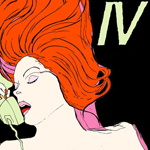So, the last time we ended with Musil's thoughts on the impersonal and personal in thinking, and we'll continue with that theme in chapter 28, "A chapter that can be skipped by anyone not particularly impressed by thinking as a profession." (Do I love that headline! I'm going to use it in my thesis, for sure.) The blockheads behind the Parallel campaign are no great minds and they care little about thinking. What about Ulrich? He sits down at his desk, plunging himself into the problems of matemathics, but that he does merely to see "whether he could do such a thing". No matter how deeply he is entagled in the precision & vigor of thoughts, his thoughts begin to stray. He finds himself thinking about his friend Walter's wife, Clarisse.
Musil/Ulrich is right, it is difficult to depict the activity of thinking. There are no great novels, no great films either, about thinking as an activity. (There are very few literary works & films about philosophers, that poor, seedy profession.) Musil's book, in fact, might be one of the first novels I have ever read that is dedicated to a depiction of
thinking. Even philosophers, for all their interest in thought (and have they ever been interested in anything else?) have had very little to say about the activity of thinking, the living, social, aspect of thinking. OK, so there's Wittgenstein, but few others.
Musil discusses a change of perspective with regard to thinking. When we manage to come up with something that is new, it is easy to think that hard work lies behind this fantastic idea. On the other hand, we might look upon the results of our mind's toil
with surprise, or even, "with a disconcerted feeling", "as a dog with a stick in his mouth trying to get through a narrow door, he will turn his head left and right until the stick slips through." From this perspective, our thoughts appear as something external to us, and secondly, it is tempting to conceive of thinking as a
process, the petroleum of which is some form of mental energy and the result of which are "thoughts". If this is how we talk about thinking, it is not surprising that thoughts appear to be impersonal. And, what is more, from this point of view, thinking starts to appear as something very uncanny: how come there are coherent thoughts and conclusions and reasoning at all? As you might have noticed, Musil has lots to say about what it is to abstain from thinking, to appear to be thinking while one is clearly avoiding any serious preoccupation. On the other hand, he is - or seems - critical of a certain glorification of thinking, of the kind that makes it into the result of mechanical, persistent training or an instance of sheer luck. For Diotima and her friends thinking is "soul"; for Ulrich it is the mechanical plodding of the mind that, for some strange reason, (some!) humans occupy themselves with.
["Say: “Yes, this pen is blunt. Oh well, it’ll do.” First, thinking it; then without thought; then just think the thought without the words. […] what constitutes thought here is not someprocess which has to accompany the words if they are not to be spoken without thought. (
Phil. Inv. § 330.)]
"The better the head, the less evident its presence in this process." If thinking is born out of such an eerie, inner process, nothing much is left to say about it. Musil contrasts all this with Ulrich's straying thoughts. Thinking about the scientific description of water only to end up with Clarisse again (who is "no better educated than a little animal"). Damn her! Oddly, Musil/Ulrich goes on to point out that the "healing power of thought", as observed by doctors and psychologists, is related to its social character - but this social character makes it impersonal. I really hope this is, yet again, the confused mind of Ulrich talking. From his point of view, what would personal dimensions of thinking, responsibility, thoughtlessness, amount to? Social thought or thought as inner process - impersonal just the same.
As is the habit of Musil, the long section on thoughts and thinking is cut short with a description of the surrounding world. This might be read as one more way to explain why thinking is
not "in the head",
not an inanimate process. Because the thinking ego, Ulrich, sits at his desk in his bourgeoisie chateau, drooling all over the idea-of-Clarisse while laboriously trying to keep his mind off her. "On the street outside a violet haze of gasoline fumes hovered."
The next chapter is about Bonadea. As you remember, she is the veiled, mysterious woman who became Ulrich's lover after his little accident. Now, Bonadea likes the state of ressentiment. She wants to quarrel, she wants to hurt (but of course a lot of questions remain as to "wants"). Even though Ulrich tells himself that he didn't want her to come, he doesn't mind her erotic company - we may leave aside the obligatory moaning about "the irrational" on his part. "Once a little while ago [...] I was still working, and before that I was on the street and bought some paper. I said hello to a man I know from the physics society, a man with whom I had a serious talk not so long ago." He thinks about having bought some paper! His mind drifts off to Walter and Clarisse. He reassures himself he's not the type who steals others' wives. There's something about Walter that really eats at him. He is buried in a lengthy soliloquy about the effemite legs of Walter, Walter's sensitivity... He returns to the subject of thinking. Only familiar thoughts will find any resonance, which explains the general stupidity of man. Again: the social-the impersonal. In this section, "personal thoughts" refer to "the thoughts of a genius". I suspect that the Genius is the only form of "Person" Ulrich admires; everything else being reduced to "qualities".
While Ulrich impatiently waits for Bonadea to get dressed - and get out of his little castle - he ruminates on the case of Moosebrugger, the sex killer. Ulrich seems to identify with the way Moosebrugger feels threatened by women. He starts talking to Bonadea about the criminal but she finds it most indecent. He goes on to give her a little lesson on morality, fidelity, rules etc. "Bonadea said nothing but sat down, with a disdainful look, in one of the luxurious armchairs and stared up, insulted, at the dividing line between wall and ceiling."









